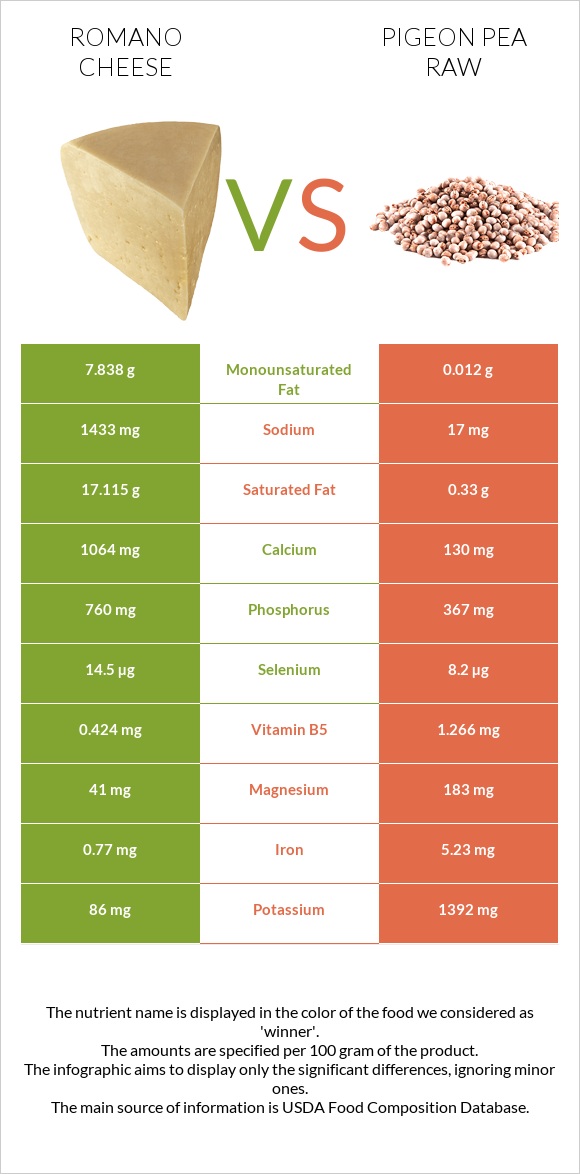Romano cheese vs. Pigeon pea raw — In-Depth Nutrition Comparison
Compare
How are romano cheese and pigeon pea raw different?
- Romano cheese is higher in calcium and phosphorus; however, pigeon pea raw is richer in copper, folate, manganese, fiber, iron, and vitamin B1.
- Daily need coverage for copper for pigeon pea raw is 114% higher.
- Romano cheese contains 84 times more sodium than pigeon pea raw. While romano cheese contains 1433mg of sodium, pigeon pea raw contains only 17mg.
Cheese, romano and Pigeon peas (red gram), mature seeds, raw are the varieties used in this article.
Infographic

Infographic link
Mineral Comparison
Mineral comparison score is based on the number of minerals by which one or the other food is richer. The "coverage" charts below show how much of the daily needs can be covered by 300 grams of the food.
| Contains more CalciumCalcium | +718.5% |
| Contains more PhosphorusPhosphorus | +107.1% |
| Contains more SeleniumSelenium | +76.8% |
| Contains more MagnesiumMagnesium | +346.3% |
| Contains more PotassiumPotassium | +1518.6% |
| Contains more IronIron | +579.2% |
| Contains more CopperCopper | +3423.3% |
| Contains less SodiumSodium | -98.8% |
| Contains more ManganeseManganese | +8855% |
Vitamin Comparison
Vitamin comparison score is based on the number of vitamins by which one or the other food is richer. The "coverage" charts below show how much of the daily needs can be covered by 300 grams of the food.
| Contains more Vitamin AVitamin A | +9500% |
| Contains more Vitamin EVitamin E | +∞% |
| Contains more Vitamin DVitamin D | +∞% |
| Contains more Vitamin B2Vitamin B2 | +97.9% |
| Contains more Vitamin B12Vitamin B12 | +∞% |
| Contains more Vitamin KVitamin K | +∞% |
| Contains more Vitamin B1Vitamin B1 | +1637.8% |
| Contains more Vitamin B3Vitamin B3 | +3750.6% |
| Contains more Vitamin B5Vitamin B5 | +198.6% |
| Contains more Vitamin B6Vitamin B6 | +232.9% |
| Contains more FolateFolate | +6414.3% |
All nutrients comparison - raw data values
| Nutrient |  |
 |
DV% diff. |
| Copper | 0.03mg | 1.057mg | 114% |
| Folate | 7µg | 456µg | 112% |
| Calcium | 1064mg | 130mg | 93% |
| Manganese | 0.02mg | 1.791mg | 77% |
| Saturated fat | 17.115g | 0.33g | 76% |
| Sodium | 1433mg | 17mg | 62% |
| Fiber | 0g | 15g | 60% |
| Iron | 0.77mg | 5.23mg | 56% |
| Phosphorus | 760mg | 367mg | 56% |
| Vitamin B1 | 0.037mg | 0.643mg | 51% |
| Vitamin B12 | 1.12µg | 0µg | 47% |
| Fats | 26.94g | 1.49g | 39% |
| Potassium | 86mg | 1392mg | 38% |
| Cholesterol | 104mg | 0mg | 35% |
| Magnesium | 41mg | 183mg | 34% |
| Protein | 31.8g | 21.7g | 20% |
| Carbs | 3.63g | 62.78g | 20% |
| Monounsaturated fat | 7.838g | 0.012g | 20% |
| Vitamin B3 | 0.077mg | 2.965mg | 18% |
| Vitamin B5 | 0.424mg | 1.266mg | 17% |
| Vitamin B6 | 0.085mg | 0.283mg | 15% |
| Vitamin B2 | 0.37mg | 0.187mg | 14% |
| Vitamin A | 96µg | 1µg | 11% |
| Selenium | 14.5µg | 8.2µg | 11% |
| Vitamin D | 20 IU | 0 IU | 3% |
| Vitamin D | 0.5µg | 0µg | 3% |
| Choline | 15.4mg | 3% | |
| Calories | 387kcal | 343kcal | 2% |
| Zinc | 2.58mg | 2.76mg | 2% |
| Vitamin E | 0.23mg | 2% | |
| Vitamin K | 2.2µg | 2% | |
| Polyunsaturated fat | 0.593g | 0.814g | 1% |
| Net carbs | 3.63g | 47.78g | N/A |
| Sugar | 0.73g | N/A | |
| Tryptophan | 0.429mg | 0.212mg | 0% |
| Threonine | 1.171mg | 0.767mg | 0% |
| Isoleucine | 1.685mg | 0.785mg | 0% |
| Leucine | 3.071mg | 1.549mg | 0% |
| Lysine | 2.941mg | 1.521mg | 0% |
| Methionine | 0.852mg | 0.243mg | 0% |
| Phenylalanine | 1.71mg | 1.858mg | 0% |
| Valine | 2.183mg | 0.937mg | 0% |
| Histidine | 1.231mg | 0.774mg | 0% |
Macronutrient Comparison
Macronutrient breakdown side-by-side comparison
Protein:
31.8 g
Fats:
26.94 g
Carbs:
3.63 g
Water:
30.91 g
Other:
6.72 g
Protein:
21.7 g
Fats:
1.49 g
Carbs:
62.78 g
Water:
10.59 g
Other:
3.44 g
| Contains more ProteinProtein | +46.5% |
| Contains more FatsFats | +1708.1% |
| Contains more WaterWater | +191.9% |
| Contains more OtherOther | +95.3% |
| Contains more CarbsCarbs | +1629.5% |
Fat Type Comparison
Fat type breakdown side-by-side comparison
Saturated fat:
Sat. Fat
17.115 g
Monounsaturated fat:
Mono. Fat
7.838 g
Polyunsaturated fat:
Poly. Fat
0.593 g
Saturated fat:
Sat. Fat
0.33 g
Monounsaturated fat:
Mono. Fat
0.012 g
Polyunsaturated fat:
Poly. Fat
0.814 g
| Contains more Mono. FatMonounsaturated fat | +65216.7% |
| Contains less Sat. FatSaturated fat | -98.1% |
| Contains more Poly. FatPolyunsaturated fat | +37.3% |